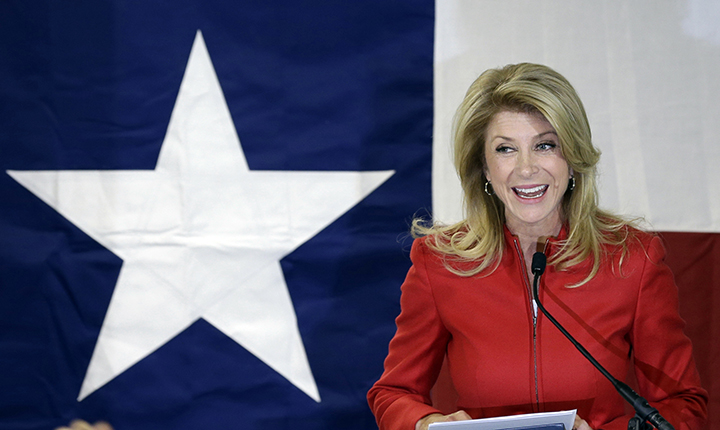By Rebecca Fiedler
Staff Writer
Republican and Democratic primaries were held Tuesday for Texas governor and state congressional positions, as well as for U.S. congressional seats. Of 125,080 registered voters in McLennan County, 1.95 percent showed up to vote in the Democratic primaries, and 8.99 percent for the Republican primaries. Now the results are in.
Voter turnout is usually low for primary elections for governor and other offices included in Tuesday’s primaries, said Kathy Van Wolfe, elections administrator at the McLennan County elections office.
“Ten to 15 percent is what we normally see,” Van Wolfe said.
Most Baylor students living on or around campus live in local precinct 3.
“We have 231 registered voters in precinct 3,” Van Wolfe said. “We had seven people vote in this Democratic primary and 22 in the Republican primary.”
Schertz senior Kimani Mitchell, president of Baylor College Democrats, said she feels this voting turnout from students needs to change.
“When there are over 15,000 students, that’s pretty bad,” Mitchell said.
“The people who are going and voting are the ones who are the most motivated,” said Scottsdale, Ariz., senior Michael Blair, president of Baylor College Republicans. “The reason they’re the most motivated is because they’re angry about something. What that leads to is that we end up getting these candidates that lean to the far right or the far left and do not necessarily reflect the values of the community they are elected to office in. I think that’s a true shame, and it only underscores the desperate need we have for people to go out and vote.”
There were many more candidates, especially locally, who ran on the Republican ballot than Democratic for these primaries, Van Wolfe said.
State senator Wendy Davis won the Democratic primary for Texas governor with 79.05 percent, and Attorney General Greg Abbott won the Republican primary with 91.50 percent.
“I think the big thing about Abbott’s win is that he’s got a lot of money,” Blair said. “He is a uniting figure in the Republican party and manages to bring in the folks who are on the far right and who are very happy with his track record of fighting the federal government’s overreach in Texas. He also brings in folks who are also more towards the middle.”
Mitchell said she thinks Davis’ campaigning went well.
“I think Davis’ win is great,” Mitchell said. “I think how much money she’s raised and the marketing she’s been able to get out works in her favor. I think it’s pretty apparent who the Democrats want for their governor ticket.”
Blair said he feels Wendy Davis does not have a united Democratic base in South Texas, which he considers a crucial factor in her chances of winning against Abbot for governor. Blair said he does not think the Democratic party is united behind Davis, whereas he said the Republican party is united behind Abbott.
“There is not a single doubt in my mind that Greg Abbott will be governor this time next year,” Blair said. “Not a single doubt.”
Mitchell offered a contrasting opinion.
“I think Wendy Davis has a fair chance of beating Abbott,” Mitchell said. “I think with all of Abbott’s campaigning, going to different places and trying to talk to people really shows how he thinks his chances are. Why campaign in an automatically Republican state? I think he’s a little nervous about his chances of winning in the face of the progress and changes that Texas is going through.”
Many major races in these primaries had candidates that either ran unopposed or who will face off in run off elections.
Runoffs occur when three or more candidates run for a position and none of the three candidates receive a majority vote of over 50 percent.
The runoffs for these primaries will be on May 27 with a week of early voting before that date.
“That will be an even smaller turnout,” Van Wolfe said.
Registered voters may vote in the run off elections even if they didn’t vote in the primaries, though if they did vote in a primary they may only vote in the runoff of the party they originally selected.
In the race for U.S. senator, incumbent John Cornyn won the Republican primary with 59.44 percent, but David Alameel and Kesha Rogers will face-off in a run off election for the democratic primary, Alameel with 47.06 percent and Rogers with 21.27 percent.
“Personally I am not surprised at all how well Cornyn did on Tuesday, considering that the anti-Cornyn vote was divided up among seven other candidates in the Republican primary,” Blair said.
Mitchell said she feels the results of this race for Democrats with Rogers and Alameel shows that voters are misinformed.
“I think the results show misinformation about Kesha Rogers,” Mitchell said. “She’s not exactly high on the list as far as true and blue Democrat. I think this showed a lack of information in voting and that people were not voting based on issues. I think some people went to the polls and just picked the name they liked the most.”
In the races for lieutenant governor and attorney general, the Democratic candidates ran unopposed.
“I think this is because of a fear Democrats have to run in what is known as a decidedly Republican state,” Mitchell said. “I think that will change in the future, but some people think ‘Why run? I’m not going to win.’”
Both of these Republican primaries resulted in the need for a runoff election, with candidates Dan Patrick and incumbent David Dewhurst competing for the lieutenant governor spot, and Ken Paxton and Dan Branch for attorney general.
“I personally thought Dewhurst would have more percentage of support than he ended up having,” Blair said. “There is a lot of discontent within the Republican party with the job that Dewhurst has done. That was reflected yesterday when you had the sitting lieutenant governor get less than 30 percent of the vote.”
With the attorney general Republican race, Blair said he felt there were three very strong candidates. Blair said he predicts Barry Smitherman’s votes will be split up to Paxton and Branch in the run off.
Bill Flores for the Republican party and Nick Haynes for the Democratic party both ran unopposed in the primaries and will be competing in November with each other for U.S. representative in Waco’s district, District 17.








